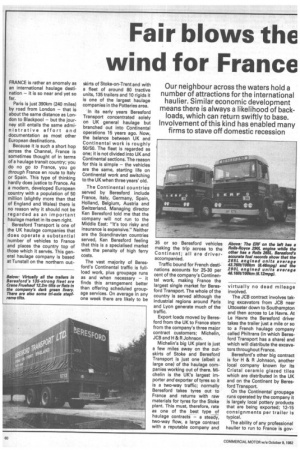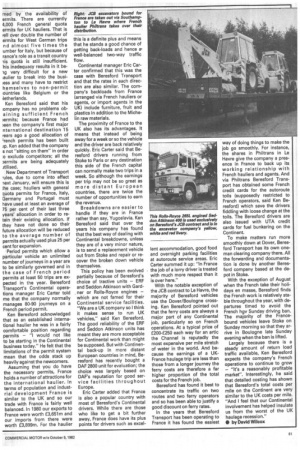Fair blows the wind for France
Page 54

Page 55

If you've noticed an error in this article please click here to report it so we can fix it.
Our neighbour across the waters hold a number of attractions for the international haulier. Similar economic development means there is always a likelihood of back loads, which can return swiftly to base. Involvement of this kind has enabled many firms to stave off domestic recession
FRANCE is rather an anomaly as an international haulage destination — it is so near and yet so far.
Paris is just 390km (240 miles) by road from London — that is about the same distance as London to Blackpool — but the journey still entails the same admin ist r a tive effort and documentation as most other European destinations.
Because it is such a short hop across the Channel, France is sometimes thought of in terms of a haulage transit country; you do no go to France, you go through France en route to Italy or Spain. This type of thinking hardly does justice to France. As a modern, developed European country with a population of 50 million (slightly more than that of England and Wales) there is no reason why it should not be regarded as an important haulage market in its own right.
Beresford Transport is one of the UK haulage companies that does operate a substantial number of vehicles to France and places the country top of those which it servos. This general haulage company is based at Tunstall on the northern out skirts of Stoke-on-Trent and with a fleet of around 80 tractive units, 135 trailers and 10 rigids it is one of the largest haulage companies in the Potteries area.
In its early years Beresford Transport concentrated solely on UK general haulage but branched out into Continental operations 15 years ago. Now, the balance between UK and Continental work is roughly 50/50. The fleet is regarded as one; it is not divided into UK and Continental sections. The reason for this is simple — the vehicles are the same, starting life on Continental work and switching to the UK when three years' old.
The Continental countries served by Beresford include France, Italy, Germany, Spain, Holland, Belgium, Austria and Switzerland. Managing director Ken Beresford told me that the company will not run to the Middle East: "It's too risky and insurance is expensive." Neither are the Scandinavian countries served, Ken Beresford feeling that this is a specialised market with the penalty of high ferry costs.
The vast majority of Beresford's Continental traffic is fullload work, plus groupage runs as and when necessary — it finds this arrangement better than offering scheduled groupage services. On average in any one week there are likely to be 35 or so Beresford vehicles making the trip across to the Continent; all are driveraccompanied.
Traffic bound for French destinations accounts for 25-30 per cent of the company's Continental work, making France the largest single market for Beresford Transport. The whole of the country is served although the industrial regions around Paris and Lyon generate much of the traffic.
Export loads moved by Beresford from the UK to France stem from the company's three major contract customers; Michelin, JCB and H & R Johnson.
Michelin's big UK plant is just a few miles away on the outskirts of Stoke and Beresford Transport is just one (albeit a large one) of the haulage companies working out of there. Michelin is the UK's largest importer and exporter of tyres so it is a two-way traffic; normally Beresford takes tyres out to France and returns with raw materials for tyres for the Stoke plant. This must, therefore, rate as one of the best type of haulage contracts — a steady, two-way flow, a large contract with a reputable company and virtually no dead mileage involved.
The JCB contract involves taking excavators from JCB near Uttoxeter down to Southampton and then across to Le Havre. At Le Havre the Beresford driver takes the trailer just a mile or so to a French haulage company called Philtrans (in which Beresford Transport has a share) and which will distribute the excavators throughout France.
Beresford's other big contract is for H & R Johnson, another local company known for its Cristal ceramic glazed tiles which are distributed in the UK and on the Continent by Beresford Transport.
On the Continental groupage runs operated by the company it is largely local pottery products that are being exported; 12-15 consignments per trailer is typical.
The ability of any professional haulier to run to France is gov rned by the availability of ermits. There are currently 4,000 French general quota ermits for UK hauliers. That is 'ell over double the number of ermits for West German trips nd almost five times the umber for Italy, but because of rance's role as a transit country us quota is still insufficient. his inadequacy results in it be ug difficult for a new 'wilier to break into the busiless and many have to restrict hemselves to non-permit ountries like Belgium or the Jetherlands.
Ken Beresford said that his ompany has no problems obaining sufficient French permits; because France had )een the company's first major nternational destination 15 rears ago a good allocation of 'rench permits has been built Ken added that the company s not "sitting on them" in order o exclude competitors; all the )ermits are being adequately
New Department of Transport -ules, due to come into effect lext January, will ensure this is the case; hauliers with general auota permits for France, Italy, Germany and Portugal must have used at least an average of 75 per cent of their last three years' allocation in order to retain their existing allocation. If they have not done so their future allocation will be reduced to the average number of permits actually used plus 25 per cent for expansion.
Period permits which allow a particular vehicle an unlimited number of journeys in a year are to be similarly governed and in the case of French period permits at least 50 trips are expected in the year. Beresford Transport's Continental operations manager Eric Carter told me that the company normally manages 80-90 journeys on a French period permit.
Ken Beresford acknowledged that as an established international haulier he was in a fairly comfortable position regarding permits — "I would not like to be starting in the Continental business today." He felt that the limitations of the permit system mean that the odds stack up heavily against the newcomers.
Assuming that you do have the necessary permits, France holds a number of attractions for the international haulier. In terms of population and industrial development France is similar to the UK and so our trade with France is fairly well balanced. In 1980 our exports to France were worth £3,651m and our imports from there were worth 0,899m. For the haulier this is a definite plus and means that he stands a good chance of getting back-loads and hence a. well-balanced two-way traffic flow.
Continental manager Eric Carter confirmed that this was the case with Beresford Transport and that the rates in each direction are also similar. The company's backloads from France (arranged via French hauliers or agents, or import agents in the UK) include furniture, fruit and plastics in addition to the Michelin raw materials.
The proximity of France to the UK also has its advantages. It means that instead of being away for a week or so the vehicle and the driver are back relatively quickly. Eric Carter said that Beresford drivers running from Stoke to Paris or any destination this side of the French capital can normally make two trips in a week. So although the earnings per trip may not be so great as more distant European countries, there are twice the number of opportunities to earn the revenue.
Breakdowns are easier to handle if they are in France rather than say, Yugoslavia. Ken Beresford said that over the years his company has found that the best way of dealing with Continental breakdowns, unless they are of a very minor nature, is to send a replacement vehicle out from Stoke and repair or recover the broken down vehicle themselves.
This policy has been evolved partially because of Beresford's choice of tractive units — ERF and Seddon Atkinson with Gard, ner or Rolls-Royce engines — which are not famed for their Continental service facilities. "We are a UK company so I think it makes sense to run UK vehicles," said Ken Beresford. The good reliability of the ERF and Seddon Atkinson units has meant they are more acceptable for Continental work than might be supposed. But with Continental back-up in more distant European countries in mind, Beresford has recently bought a DAF 2800 unit for evaluation; the choice was largely based on DAF's reputation for good service facilities throughout Europe.
Eric Carter added that France is also a popular country with most of Beresford's Continental drivers. While there are those who like to get a bit further away, France does have its plus points for drivers such as excel lent accommodation, good food and overnight parking facilities at autoroute service areas. Eric Carter summed it up: "In France the job of a lorry driver is treated with much more respect than it is over here."
With the notable exception of the JCB contract to Le Havre, the majority of Beresford vehicles use the Dover/Boulogne crossing. Ken Beresford pointed out that the ferry costs are always a major part of any Continental job, particularly so on French operations. At a typical price of £200-£250 each way for an artic the Channel is reputedly the most expensive per mile stretch of water in the world. And because the earnings of a UKFrance haulage trip are less than those from a longer journey the ferry costs are therefore a far higher proportion of the total costs for the French job.
Beresford has found it best to concentrate its traffic on two routes and two ferry operators and so has been able to justify a good discount on ferry rates.
In the years that Beresford Transport has been operating to France it has found the easiest way of doing things to make the job go smoothly. For instance, the shares in Philtrans in Le Havre give the company a presence in France to back up its working relationship with French hauliers and agents. And via Philtrans Beresford Transport has obtained some French credit cards for the autoroute tolls (supposedly restricted to French operators, said Ken Beresford) which save the drivers fiddling with loose change at the tolls. The Beresford drivers are also issued with UTA credit cards for fuel bunkering on the Continent.
To make matters run more smoothly down at Dover, Beresford Transport has its own oneman clearing company there. All the forwarding and documentation is done by another Beresford company based at the depot in Stoke.
With the exception of August when the French take their holidays en masse, Beresford finds the French work is relatively stable throughout the year, with departures timed to avoid the French hgv Sunday driving ban. The majority of the Francebound vehicles leave Stoke on Sunday morning so that they arrive in Boulogne late Sunday evening when the ban is lifted.
Largely because there is a steady amount of return load traffic available, Ken Beresford expects the company's French operations to continue to grow — "it's a reasonably profitable market". Interestingly, he said that detailed costing has shown that Beresford's total costs per mile on the Continent are very similar to the UK costs per mile. "And I feel that our Continental involvement has helped insulate us from the worst of the UK haulage recession."
• by David Wilcox
































































